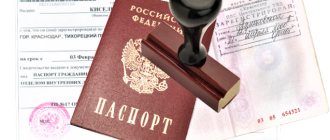If you have temporarily moved from your permanent place of residence to a new one - for example, you came on a long business trip, for training, or have just moved to a new city - you need to register temporarily at the address where you will live. This is a legal requirement. In addition, temporary registration gives a person a number of advantages.
Why do you need temporary registration?
Thanks to temporary registration at the place of residence, a person can use some government and commercial services:
- apply for compulsory medical insurance treatment at a hospital or clinic at your place of stay;
- receive social support, benefits and benefits in social security;
- apply for participation in government support programs (for example, “Young Family”);
- enroll children in a municipal school or kindergarten;
- receive assistance in finding employment at the place of temporary registration;
- obtain a loan from a bank that requires registration in the region where the bank office is located.
Many employers are critical of candidates who are not registered in the region of work. Temporary registration for a long period can solve this issue.
The mandatory registration of registration at a temporary address is established by Federal Law No. 5242-1 of June 25, 1993. If you have registration, you will not be fined for violating it.
Payment for housing services
Registration of strangers on the territory of your home can increase the cost of utility bills, which many landlords are afraid of.
According to Art. 30 of the Housing Code of the Russian Federation, the obligation of the property owner is to maintain his home, except for the circumstances specified in the Federal Law or an agreement with a service company.
If the apartment does not have meters and additional residents move in, payments for electricity, gas and water may increase.
These costs also increase automatically due to the fact that more people use household services.
All other indicators do not affect housing and communal services payments. The homeowner can agree with the tenant to reimburse part of the utilities.
Important: if the tenant or other person legally residing in the house has agreed with the owner on the payment of housing and communal services expenses at the expense of the tenant, this fact should be indicated in the agreement. Otherwise, the apartment owner will not be able to legally demand compensation for payments.
Permanent or temporary registration?
Temporary registration differs from permanent registration in terms of residence at the chosen address. For example, a person is constantly registered at the place of his usual residence, where he lives most of the time. A stamp confirming such registration is placed in the passport.
Read in detail:
How to obtain permanent registration in an apartment or house.
Temporary registration is required if you live for a limited time, more than 90 days, in a certain place. For example, you arrived on a long-term business trip or for training. Instead of a stamp in your passport, you are given a special certificate with the seal of the Ministry of Internal Affairs, which you must always carry with you for possible document verification.
Sample certificate of temporary registration
Having a temporary residence permit does not cancel a permanent one.
What will happen to rent and other payments?
They will grow up. According to the rules of modern legislation, a person lives where he is registered.
Accordingly, he is obliged to pay for the services provided to him. The amount of rent increases with the addition of each new one registered.
As you can see, there is nothing comforting for the owner in the prospect of permanently registered residents. It will be extremely difficult to get rid of them if they themselves do not want it, but it is still possible through the courts.
And if we are talking about municipal housing, then this will mean that you yourself have given a person the legal opportunity to become a co-owner of your home.
Where to start with temporary registration
To obtain a temporary residence permit, you will need a number of consents, which you need to find out in advance:
- temporary registration in a privatized apartment necessarily requires the consent of the owner - the one who is indicated in the extract from the Unified State Register of Housing as the title owner;
- if you are the owner of the apartment in which you are registering temporary registration, you do not need anyone’s consent (even if you only own a share, you do not need to ask the permission of the co-owners);
- if the apartment is in a state or municipal fund and you are its only user, you do not need to take anyone’s permission;
- if in a state-owned apartment or other residents are registered with the municipal fund, you will have to obtain their consent;
- If the apartment is municipal (non-privatized), temporary registration can only be obtained by concluding a sublease agreement.
In all cases where consent is required, it is drawn up when submitting documents for registration. That is, all those who record their consent must come to submit documents - the owner, registered residents. If you can’t come in person, you can contact a notary, who will issue a written consent for an additional fee.
Is it possible to register an outsider?
The legislation does not prohibit the owners of residential premises from registering strangers, but here it is worth considering a number of inconveniences that may arise after receiving a mark in the passport :
- The owner of the apartment will not be able to freely dispose of his property: for example, when selling, the consent of all registered residents will be required.
- If you register a stranger who has a minor child in the living space, he will be able to register him without the consent of the owner, and he will be able to register him only after he reaches the age of majority.
It is also worth considering the type of property:
- Privatized apartment. You can register any person, because
...
the owner is free to independently dispose of his property
. The number of registered persons is not limited by law. - Municipal. Here, the consent of the landlord and all citizens registered in the living space will be required.
If the living space was purchased with a mortgage and the debt has not yet been repaid, it is necessary to obtain the approval of a credit institution to register a stranger or relative there.
Where to go to obtain temporary registration
Documents for temporary registration can be submitted in three ways:
- in person to the department - to the Ministry of Internal Affairs (department for migration issues) or any office of the MFC (My Documents) by appointment or on a first-come, first-served basis;
- passport offices at management companies and homeowners' associations also accept documents for temporary registration;
- online through State Services, having previously prepared scans of documents;
- by mail - but this method is unpopular due to delays in the delivery of written correspondence, as well as the high cost, because all documents will have to be certified by a notary.
Regardless of the method of submission, the application is ultimately considered by the department of the Ministry of Internal Affairs for Migration Issues, serving the desired address. This is where you will need to come to receive a certificate of temporary registration.
Rights and obligations of temporarily registered citizens
Persons registered in the premises for a certain period may remain there for the specified period and use all the services provided. Upon completion of registration, they are required to leave the apartment. If people deprived of the right to be on the territory of the living space refuse to leave it, the owner can call the police or write a statement to the court
. The claim must be satisfied, regardless of who the evicted citizen is.
The rights of homeowners are protected by such regulations as the second section of the Housing Code and the Civil Code of the Russian Federation.
People with disabilities, incapacitated persons, and current and former relatives of the owner must leave the apartment after termination of registration. The reservation in this matter is made only regarding minors.
List of required documents for temporary registration
To obtain a temporary residence permit you will need:
- ID card (passport);
- Russians permanently residing abroad provide a foreign passport;
- a document confirming the right of residence at the appropriate address (for example, a social tenancy agreement, an extract from the Unified State Register of Real Estate, an application from the owner providing housing);
- for the child - birth certificate.
The owner of the property brings his passport and a document confirming his rights to the property. Housing users living in an apartment from a private fund also bring documents - passports and confirmation of rights to the apartment.
Application form No. 1 (text file for editing) for temporary registration is filled out at a personal appointment or in an online form; you do not need to download or fill out anything in advance. If you send an application by mail, you need to fill out form No. 1PR (text file, can be edited).
For a non-privatized apartment
To register in a non-privatized apartment, you will need to draw up a sublease agreement, otherwise registration will simply not be issued. It is concluded between the tenant and the new tenant with the consent of all living tenants and the landlord. You can obtain documents from the local administration serving the area. In Moscow, you need to contact the Moscow City Property Department.
Material risks of the homeowner
Here it is worth explaining each risk in detail, given how different they are:
- Risk of loss of property rights. Does not exist, since temporary registration has absolutely nothing to do with the ownership of real estate, no matter who the temporarily registered person is, no matter what age he is.
- Increase in utility bills. That part of them, which is paid not according to meters, but according to the number of registered persons, will increase in proportion to the number of residents. If the rental agreement does not indicate the obligation of tenants to pay for utilities, then the owner of the property will pay for them.
- Inconsistency between the timing of registration of the minor’s parents and the minor’s own. For example, if the child’s registration period has not yet expired, but the temporary registration period for his parents has expired, then they will be able to legally register with their child again.
- Erroneous registration of a minor, not on a temporary, but on a permanent basis, will not allow him to be later discharged even in court. You will have to sell your home, from which the new owner can remove the minor on the basis of Art. 292 of the Civil Code of the Russian Federation and Article 31 of the Housing Code of the Russian Federation.
To summarize, we can say that registering a minor does not entail any risk for the owner of losing rights to real estate, but it is much more difficult to register a minor than his parents, and sometimes this is only possible in court.
How to apply for temporary registration in an apartment step by step
Regardless of which apartment requires temporary registration - privatized or non-privatized - the sequence of actions will be the same.
Step one. Collection of documents
Collect documents from the list. At a minimum, you will need a passport of the tenant and owner of the apartment, documents on housing ownership. As a maximum, first conclude a sublease agreement with the administration/department. There is no need to fill out consent and application in advance; this is done at the reception of documents.
If the owner or residents registered in a non-privatized apartment cannot appear in person for registration, their written consent must be obtained in advance from a notary.
Step two. Submitting documents for registration
You can submit documents in person, by mail or through State Services. The safest way is to do this in person through the nearest MFC office (My Documents) or directly at the Ministry of Internal Affairs (police) department dealing with migration issues during reception hours. You need to bring originals and copies of all necessary documents with you and bring people whose consent is required to obtain temporary registration.
The most convenient and fastest way is to submit documents electronically through State Services. Those who have a verified account can take advantage of the opportunity. Not all regions have implemented this opportunity, but in large cities and administrative centers of the country’s constituent entities everything is already working. Documents are submitted in the form of scans or their details are indicated for verification. The application goes directly to the department of the Ministry of Internal Affairs.
Step three. Obtaining a certificate of temporary registration
After the established period – 3 working days – a ready certificate of temporary registration is issued. The period may increase if you submit an application through the MFC or by mail. Sometimes the deadlines are extended if the Ministry of Internal Affairs is forced to make an interdepartmental request for documents, for example, if the sublease agreement referred to by the applicant is not provided.
The certificate can also be received by mail. This is indicated in the application for temporary registration.
Risk of damage to property by tenants
Are the new tenants decent people or not? There is no way to know this in advance. And the registration of an unknown person only aggravates the fears. After all, if these are just tenants without a contract, without registering a place of residence, in the event of some inappropriate actions on their part, you can take and evict these individuals. And if there is a registration, then everything will have to be decided either through the court, or wait for the registration period to expire.
Temporary registration deadlines
The standard period for temporary registration is 3 working days. The day of submission and issue of documents is not included in them. The period will be increased if you submit documents not directly to the police, but to the MFC or by mail. Interdepartmental requests also increase registration time - they are necessary in some cases to verify information from the application.
The applicant, in turn, has a week to apply for temporary registration. Registration is required if you are staying at your address for 90 days or more. If the tenant does not do this himself, the owner is obliged to notify the police about his residence within the next 3 days.
Is it possible to register without the right to living space?
You can go to a private apartment. After all, in fact, registration is like that. does not give any other rights except the possibility of residence, as well as the unhindered use of common property.
A person can become an owner only as a result of receiving square meters by inheritance, will, as a gift, as a result of a rent agreement, as well as by privatizing housing.
Registration at address is purely of a notification nature in order to clearly indicate where a given citizen lives.
This may be fundamentally important for obtaining a VHI policy, a loan, a new job, subsidies, or enrolling a child in a kindergarten or school.
Frequently asked questions about temporary registration
A lot of questions are often asked about temporary registration; we have collected answers to some of them below.
What are the consequences of temporary registration for the owner of an apartment? Owners often worry that the temporary tenant will receive some rights to the apartment itself and sue them for part of the living space. This is wrong. The tenant has the right to live in the apartment for a specified period, but does not acquire any rights to the home itself as the owner. You also won’t have to pay any taxes for the new tenant, with the exception of a number of utilities.
Is it legal to charge a fee for registration? This issue is not regulated by law; there is no clear prohibition on charging residents for registration. Only cases of mass registration, when 400 temporary residents are registered on 36 square meters, deserve the attention of the authorities. Other cases of temporary registration, when the owner charges a fee for registration, are, as a rule, not controlled by anyone.
What are the fines if there is no temporary registration ? Responsibility for the lack of temporary registration is established by Art. 19.15.1 Code of Administrative Offenses of the Russian Federation. Under this article, for lack of registration at your place of residence, you can be fined up to 4,000 rubles in the regions and up to 5,000 rubles in Moscow and St. Petersburg. A homeowner who fails to report a temporary tenant faces fines of up to 7,000 rubles. You will not be fined if: - your permanent registration is in the same region; — you live in Moscow Region and work in Moscow and vice versa; — the same rule works for St. Petersburg and the Leningrad region; - you live in an apartment owned by your close relative (spouse, child, parent, grandparent, grandchild, brother or sister).
Is it possible to bypass the requirement for temporary registration? Often, in order not to obtain temporary registration, they buy a new ticket to the region of residence every 90 days. In this case, you must always carry the ticket with you and present it when checking. This may be partly justified and you won't really be fined, but in the long run it can be an expensive option to solve the registration problem.
What should the owner of the premises do?
Most landlords want to hide profits from the government to avoid legally paying taxes. Therefore, they are in no hurry to issue temporary registration to residents
.
Such actions are an offense
. The owner of the premises is obliged not only to register tenants for some time, but also to independently inform the Federal Migration Service if this procedure is not completed within 90 days.
If it is established that people living in the house violate the registration rules, the owner faces problems:
- he receives a fine in the amount of 100 to 500,000 rubles;
- forced labor is assigned;
- possible imprisonment for up to 3 years and a ban on holding certain positions.
The owner of the premises must not give his consent to the registration of persons who are not his relatives and registered in the same locality.
If the owner refuses to register a tenant who has the right to do so, the tenant may go to court.
What rights does registration give you? What you need to know
Issues related to housing always worry people. Buying, selling, registering and much more concerns almost every Russian at one stage or another in life. The most important thing is registration, because it is the registration process and its features that remain unclear to many people. What does registration in an apartment give? Does it provide ownership rights? The answers to these questions can be found in our article.
To begin with, it is necessary to clearly define what propiska is - this is the process of registering a Russian citizen at the place of his stay or residence, which acts to create all the necessary conditions to ensure his rights, on the one hand, and fulfill his duties, on the other hand. According to the current legislation of the Russian Federation, every citizen must have a residence permit.
Early cancellation of registration of citizens
In some cases, it is possible to evict a person or deregister him without his consent. Such actions are permitted not only after the end of the temporary registration period, but also in connection with the following circumstances:
- Mobilization or conscription into the armed forces by decision of the military commissariat.
- Imprisonment. The citizen is deregistered when the sentence comes into effect.
- Death or recognition as missing. The extract is made after the relevant court decision has entered into legal force.
- Eviction through the competent authorities for damage to property, storage of explosives in the apartment, presence of a dangerous chronic diagnosis.
- Registration of an individual at a new address.
- Provision by a citizen of fictitious or forged documents through which registration was carried out. A court decision is required.
- Establishing an act of violation on the part of the FMS inspector regarding the provision of temporary registration to an individual.
How long to wait and how much does the procedure cost?
The law stipulates the waiting period for registration after submitting an application, and it is no more than a week. In practice, migration officials are forced to extend this period. The reason for this is the need to request in other regions any information about the applicant.
Demanding payment for the provision of this type of service is illegal. The law does not provide for any type of payment for registration at the place of residence.
If you found out how much such a procedure costs, then you should know - several years in prison for a bribe. This action is completely free.
We recommend that you pay attention to other useful publications by our experts on the topic of registration:
- How does the number of registered ones affect the amount of utility bills?
- How does registration take place in your own apartment at your place of residence?
- The nuances of registration in a non-privatized apartment and whose consent is required for this?
- How does registration take place in a privatized apartment?
- Permanent registration without the right to living space.
- How many people can be registered in one apartment?
The danger of registering certain categories of citizens
Difficulties and unforeseen situations may arise in the case of registration of not only children, but also some other social strata. These include refugees and pregnant women.
In the first case, visitors may have children, information about which they are in no hurry to provide. Also, according to the law, when registering forced migrants, it is required to notify not only the local passport office, but also the regional departments of the Federal Migration Service.
. And if the owner of the living space forgets about this procedure, and the refugees appear at the migration service, the owner of the apartment will be fined.
There is one more nuance regarding immigrants. Numerous relatives often come to “visit” them for six months or more
. This issue can be resolved with the participation of police officers or the Federal Migration Service.
As for pregnant women, their temporary registration in itself does not involve any risk, because formally they are ordinary citizens.
Problems may appear after the baby is born. As described above, the mother has the right to register the baby without even telling the homeowners about it
. After which she can register with her child herself.
There are also known out-of-the-ordinary cases when visitors who have received temporary registration change the locks in the apartment and threaten the owners or commit other offenses. Such situations are considered only in court, and a lot of nerves and effort are spent on eliminating them
. So, when deciding to register a stranger in your home, you need to weigh the pros and cons.
Additional disadvantages of such registration for the owner
| Situation | Consequences |
| Temporary resident takes out a loan | Bank representatives and collectors will look for him at your address |
| Tenant commits a crime | The police will visit you first and it is even possible that you will have to be a witness in the case or, worse, an accomplice |
| The person registered with you is evading conscription into the army. | Summons will be sent to your address, and military registration and enlistment office employees may even think that you are hiding a conscript |
| The temporarily registered resident has a car | All his fines and notices of administrative violations on the roads will be sent to you |
| The tenant leads an immoral lifestyle | The most unexpected - from constant noise, drunkenness and scandals with the owner to illegal actions directed at him |
Registration of young children
Registration of children is carried out in an apartment, in a house, if the parents are registered there, the consent of the owners or residents is not required for this. Registration will protect the child from attacks on his rights - it is extremely difficult to discharge or evict a minor; this requires permission from the guardianship authorities and a court decision.
The owner of the apartment and the people registered there have the same rights to live in the premises, housekeeping and shared use of utilities. However, only the owner who has a certificate of ownership of housing is given complete freedom in matters of disposing of real estate and registering people in his house (apartment).
If you didn’t find the answer to your question in the article, contact your duty lawyer for advice. in the form below or online to a consultant (form below right). For free!
The need to register at the place of stay
When determining why temporary registration is needed, it is necessary to highlight the main points of its importance for both parties, the citizen and the state:
- for the state, the duty of a citizen to register at his temporary place of residence with the registration authorities is of a notification nature, required for migration, statistical and registration activities;
- For a citizen, temporary registration allows you to exercise your rights and acquire social services guaranteed by the state.
The need to acquire temporary registration in some circumstances is confirmed by the fact that state legislative acts establish liability for exceeding 90 days when staying in a populated area without obtaining temporary registration.
Important! Article 3 of the Federal Law of the Russian Federation dated May 25, 1993 N 5242-I “On the right of citizens of the Russian Federation to freedom of movement, choice of place of stay and residence...” determines that the lack of registration does not serve as a limitation or condition for the exercise of rights and freedoms guaranteed by the Constitution of the Russian Federation.
Registration for refugees and military personnel: does their status affect the owner of the home?
Resolution No. 713 states that the temporary registration of refugees and military personnel is carried out according to the usual rules, that is, their “special” status does not affect the rights and obligations of both parties. But at the same time, there is a caveat for each category. Thus, registration is carried out as usual if:
- refugees received the status of forced migrants;
- military personnel are contract soldiers, not conscripts.
Temporary registration will not be required at all for those military personnel who are on a business trip or vacation.
What does a fictitious registration pose to the owner (consequences)
There are offers on the Internet for obtaining temporary registration. Why is this necessary?
Several versions are considered here:
- parents want to enroll their child in a prestigious school, for this they need to register at the address assigned to a specific educational institution;
- registration in some cities allows you to receive benefits and subsidies at the birth of a child;
- Temporary registration will allow you to receive subsidies for housing construction in rural areas.
Fictitious registration has negative consequences for the homeowner.
If such illegal actions are detected, the violator faces (Article 322.2 of the Criminal Code of the Russian Federation):
- a large fine, its amount is 100,000 - 500,000 rubles;
- imprisonment for up to 3 years.
Not only the owner of the residential premises who agreed to deceive, but also the child’s parents will be punished.











